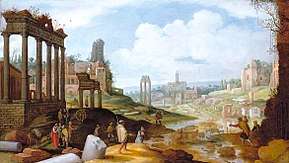Ash heap of history
The phrase "ash heap of history"[n 1] literarily speaking refers to ghost towns or artifacts that have lost their relevance.

17th century view of Rome with ruins.
Visiting Rome in the 14th century, Italian writer Petrarch called the city "a rubbish heap of history".[2]
A notable usage was that of the Russian Bolshevik Leon Trotsky referring to the Mensheviks: "Go where you belong from now on – into the dustbin of history!" as the Menshevik faction walked out of the All-Russian Congress of Soviets on 25 October 1917 in Petrograd.[3][4][5][6] In a speech to the British House of Commons (8 June 1982), U.S. President Ronald Reagan later responded that "freedom and democracy will leave Marxism and Leninism on the ash heap of history".[7]
Notes
- Alternatively: "dustbin of history", "dust heap of history", "trash heap of history", "garbage heap of history", "ashcan of history"[1]
References
- Safire, William (16 October 1983). "On Language; Dust Heaps of History". The New York Times. Retrieved 13 March 2016.
- Hibbert, Christopher. Rome: The Biography of a City. Google books: Penguin Books. pp. Chapter six. ISBN 978-0140070781. Retrieved 28 April 2018.
- Liberman, Mark (23 December 2011). "The What of History?". Language Log. Retrieved 23 December 2011.
- Sonne, Paul, "The Dustbunnies of History", The Oxonian Review 8 June 2009 • Issue 9.7. ISBN 978-0-571-22875-1
- Bertrand M. Patenade (2009) Stalin's Nemesis: The Exile and Murder of Leon Trotsky, Faber and Faber, pp. 193–194, 352. ISBN 978-0-571-22875-1
- Maureen Healey (2004), "11 Dictator in a Dumpster: Thoughts on History and Garbage", in Alun Munslow, Robert A. Rosenstone (ed.), Experiments in Rethinking History (illustrated ed.), Routledge, p. 225, ISBN 978-0-415-30146-6
- Pipes, Richard (3 June 2002). "Ash Heap of History: President Reagan's Westminster Address 20 Years Later". Heritage Foundation. Archived from the original on 17 September 2013. Retrieved 13 February 2007.
This article is issued from Wikipedia. The text is licensed under Creative Commons - Attribution - Sharealike. Additional terms may apply for the media files.